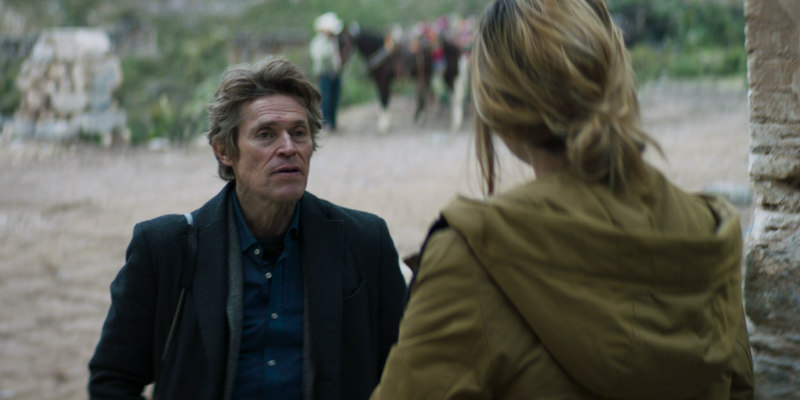
Review by Benjamin Poole
Directed by: Daniel Graham
Starring: Willem Dafoe, Andrés Almeida, Irene Azuela, Cassandra Ciangherotti

I’ve got a bit of a soft spot for Willem Dafoe, so Opus Zero, Daniel Graham’s abstract meditation on death and art, which relies on an imperial central performance from the star of 2007’s Mr. Bean’s Holiday, was always on to a winner. It’s the voice: so authoritative, yet ringing with sadness, a hint of whimsy. The look, too: never handsome as such, but striking, undeniable; equal parts mean and kind, like a monkey that is cross. It’s like he’s never aged, either: he’s always looked this old. There’s something timeless about Mr. Dafoe, Methusalem even - an inference bolstered by the sheer amount of (good) work the guy has done. This is a man, after all, who iconically played both Jesus and His spiritual opposite The Green Goblin with equal conviction (plus anyone who has hot wax poured over their tits by Madonna deserves not only our respect but our undying sympathy, too - cf. Body of Evidence).


It is a challenge to think of another actor who could carry off the premise of Opus Zero with such naturalistic panache, seeing as the first act of the film exclusively focuses upon our Willem (playing Paul, a musician) returning to the most antiquated village in Mexico following the death of his father, who formerly resided there. The first act’s plot almost entirely involves Paul wandering about the village in a bit of a grief-daze, having mad deep conversations with the locals (sample dialogue with a tour guide: "Everything that ever was, always will be. Nothing disappears," Woah!) while wrestling with the direction of his latest composition.

The style of the film is more none-more-chiaroscuro, the sort of overtly suggestive murk which would prompt Rembrandt himself to politely suggest knocking on a couple more candles, in a grand visualisation of the film’s searching existential themes. Between contemplating the nature of silence (which "doesn’t exist" and is simply the "means by which we measure sound" - is this the year’s most quotable movie?) and mourning the death of his dad, Paul also happens upon the unsolved mystery of a woman who went missing from the village many years ago…
[ READ MORE: Interview - Opus Zero Director Daniel Graham ]
This plot point opens the film up for more lofty thematic exploration, which again is held together by Dafoe’s deeply persuasive performance. There is the central conceit of a device owned by Paul, a two-way earpiece which renders Spanish to English and vice-versa (you know, like the universal translator in Star Trek), which I guess is some sort of metaphor to consolidate Opus Zero’s ideas surrounding connection and the essential impermanence of being.

But just as you worry that things are getting a bit, you know, pretentious, Opus Zero flips its approach by introducing a second act group of documentary filmmakers who arrive at the same village as Paul ("I’m in the middle of someone else’s narrative," he meta-bemoans as he becomes a bit player in this latter half) and in doing so alter the tone of the entire movie. The crew attempt a manufacture of authentic experience, most notably when they ask an old lady to ‘re-walk’ down the street, as an attempt to capture local flavour didn’t quite work on the first attempt. As the earthy crew clod hop about the village in meaningful contrast to Paul’s graceful contemplation the moody shadows melt away to the flat and unimaginative light of real life. Is Opus Zero undermining its meditative first act with this bravura volte-face, or is the tackiness of the film students a double down on its spiritual pretences? There’s little time to contemplate this though, as towards the end Graham throws in a metaphysical surprise that tweaks the film into the realms of delightfully nuts magic realism. Both playful and deeply serious, Opus Zero is a beautiful abstraction.

But just as you worry that things are getting a bit, you know, pretentious, Opus Zero flips its approach by introducing a second act group of documentary filmmakers who arrive at the same village as Paul ("I’m in the middle of someone else’s narrative," he meta-bemoans as he becomes a bit player in this latter half) and in doing so alter the tone of the entire movie. The crew attempt a manufacture of authentic experience, most notably when they ask an old lady to ‘re-walk’ down the street, as an attempt to capture local flavour didn’t quite work on the first attempt. As the earthy crew clod hop about the village in meaningful contrast to Paul’s graceful contemplation the moody shadows melt away to the flat and unimaginative light of real life. Is Opus Zero undermining its meditative first act with this bravura volte-face, or is the tackiness of the film students a double down on its spiritual pretences? There’s little time to contemplate this though, as towards the end Graham throws in a metaphysical surprise that tweaks the film into the realms of delightfully nuts magic realism. Both playful and deeply serious, Opus Zero is a beautiful abstraction.

Opus Zero comes to UK DVD October 28th.
"The humour is so cheesy and cringe-worthy that it's impossible to square this movie as taking place in the same universe as James Cameron's gritty original."— 𝕋𝕙𝕖𝕄𝕠𝕧𝕚𝕖𝕎𝕒𝕗𝕗𝕝𝕖𝕣.𝕔𝕠𝕞 🎬🎃 (@themoviewaffler) October 23, 2019
TERMINATOR: DARK FATE is in UK/ROI cinemas now.
Read @hilliseric's reviewhttps://t.co/LufKVQ6g0K pic.twitter.com/1F5kRt3z1a

